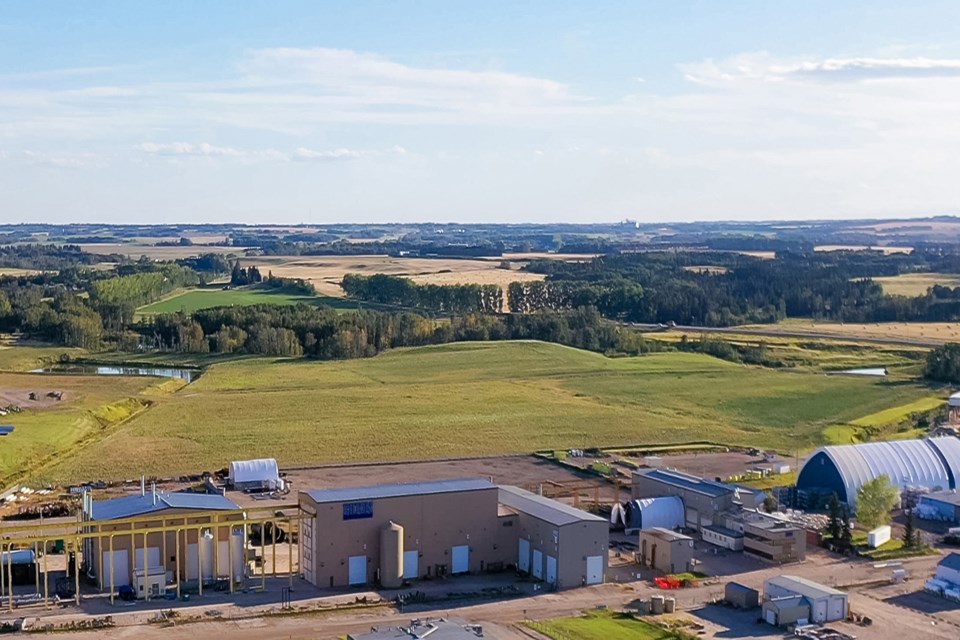INNISFAIL — Town council has passed first reading of a borrowing bylaw designed for multi-million-dollar funding to develop the 46 acres of new industrial land south of 37th Street.
The move on May 24 follows council’s approval on April 25 to direct administration to tender the development of the new industrial land, which the town now calls the SW Industrial Park, at a budgeted amount of $5.5 million, monies that will largely come through an approved new borrowing bylaw.
On May 9, the Town of Innisfail set the price for parcels of land, which start at a price point of $160,000 per acre for potential purchasers. That market price will remain in place until at least July 29.
“Yes, there has been interest for sure,” said mayor Jean Barclay last week of the initial public response. “I’m very confident and looking forward to the project getting underway.”
The borrowing bylaw was formally introduced to town council on May 24 through a comprehensive report from Erica Vickers, the town’s director of corporate services.
She said the bylaw proposed is for a debenture over 10 years. Council was told the recovery of the estimated $5.5 million cost of the development, as well as the interest for borrowing, will be recovered through the sale of the lands.
The process that a municipality must follow to borrow money for the construction of capital property is lengthy and must follow the provisions laid out in the provincial Municipal Government Act.
Vickers told council the process for Innisfail’s new borrowing bylaw will take about three months before it’s deemed valid and approved.
Council was told borrowing for capital property with a term longer than five years must be advertised.
After the first reading of the bylaw, which Innisfail council unanimously approved on May 24, the municipality must publish a notice based on estimated or tendered costs once a week for two consecutive weeks in at least one newspaper circulating within the limits of the municipality.
Local citizens can, within 15 days from the date of the last publication of the notice, petition council for a vote on the borrowing bylaw.
If a valid petition is presented to council within the specified time period, council may abandon the project, or move ahead and put the bylaw to a public vote. If citizens agree by vote council can move ahead.
If no petition for a vote is presented, council can move into second and third reading of the borrowing bylaw.
If the borrowing bylaw does not pass, administration will not be able to move forward with this project. If the bylaw is approved the town must go through a 30-day waiting period before it’s legally valid.
As for where the financing will come from for the debenture, that has not yet been decided.
However, Vickers said she did attempt to call one local financial institution but had no response. She presented council with a Government of Alberta option for financing municipal capital projects.
Council was told the current 10-year interest rate offered by the Government of Alberta is 4.29 per cent.
Vickers said the loan type could be a semi-annual payment of interest only beginning Dec. 15, with the last payment in 2032 consisting of the entire principal and the final interest payment.
Vickers’ report said the semi-annual interest payments would be $117,975 or $235,950 annually, with these compensated by the sale of lands in the SW Industrial Park.
She told council the town won’t be able to apply for a government loan until October, with the funds coming in December.
Vickers told council the estimated revenue the town will make by selling all 46.1 acres of saleable industrial land at $160,000 an acre over the 10-year term will be $7,376,000. With the repayment of the $5,500,000 debenture, that would leave a balance of $1,876,000.
With interest rates totalling $2,359,500 the town would be left with a $483,500 deficit, which Vickers said could be covered by increasing land sales prices or using town reserves or by raising taxes.
Council was told the town currently has a $2,951,204 balance in the Land Acquisition/Servicing Reserve, which is not factored in any of Vickers’ calculations for the 46.1 acres or projected revenues.
“That is a combination of any land sale that we have,” said Vickers. “Any of the revenue from the land sale will go into that reserve but it has been sitting there for many, many years.”



